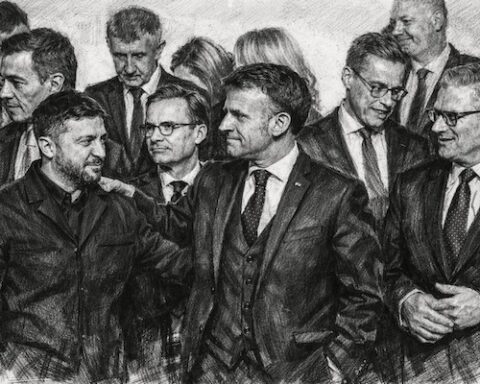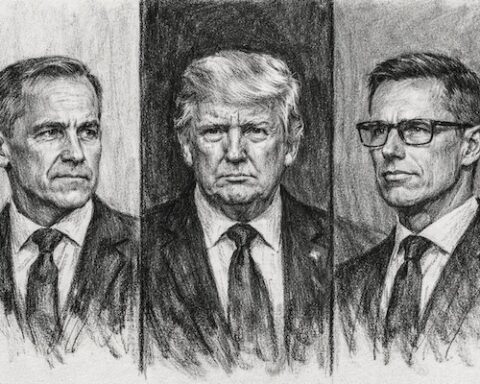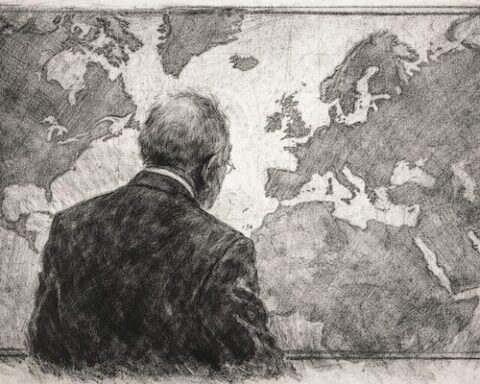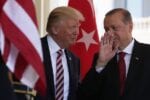A combat officer’s tribute to those that helped him survive in a foreign and hostile land: the noble interpreter.
As a young combat arms officer deployed in Iraq, I didn’t know much about the language or culture of the Iraqi people, let alone the Muslim world. We received PowerPoint briefings and pocket-sized quick reference guides that we could use with the local population if we were in a bind. While these were great ideas, they hardly worked when I was on the ground. Like many Americans, I had learned about Islam and the Muslim World from documentaries, or action movies such as Rambo. While these were somewhat educational and/or entertaining, they could not have prepared anyone for a combat deployment inside the Arab world.
In 2004, I landed in Kuwait as a Fire Support Officer assigned to a Light Airborne Infantry Company, where we spent three weeks preparing for combat operations. Once we arrived to Baghdad, I was assigned a sector West of Baghdad, and began combat missions that included mounted patrols, dismounted patrols, intelligence gathering missions and civil military operations. Needless to say, I felt like a pilgrim in an un-holy land. Not only were people speaking various forms of Arabic, but the signs were in Arabic as well. It was expected that I would have to totally immerse myself into their country and culture so that was not the issue. What I did not expect, nor was I trained for, was how to properly utilize a foreign born translator in a combat zone.
When I met my first translator, he had been working with the previous unit that we were replacing. They had nothing but praise for this young Iraqi citizen who would go out on patrols with the unit every day. One day a soldier heading home shared with me an amazing story. While clearing Saddam’s zoo, an unexpected, and deadly predator had come to bear. Unknown to a US soldier, he was being stalked by a crazed lion. Quick thinking led the interpreter to take down the lion with a shot. He saved a soldier that day from being attacked, not by anti-Iraqi forces, not by Al-Qaeda in Iraq, but from a hungry lion.
After a few weeks on the ground and learning about the people and culture, I was tasked out to the Radwaniyah Civil Military Operations Center (CMOC) where I was able to interact with local nationals on a daily basis. From the military perspective, it was the ultimate intelligence gathering opportunity. I was a Field Artillery Officer with a mission to “destroy, neutralize or suppress the enemy by cannon, rocket and missile fire,” not an intelligence officer whose mission is to gather intelligence and provide feedback to the commander. I was able to dress down and be approachable to the local population from a secure location where US Military, Iraqi government officials, and local leaders could meet and discuss issues.
Interacting with local government and religious leaders outside the wire on a daily basis made us a very unique asset to not only my chain-of-command, but to the US Marines in the next sector over, and the US Special Ops community as well. We were able to hold local leaders accountable for attacks that occurred within their community, and allowed them the opportunity to tell us what they knew, or face consequences from either the US Military or the Iraqi government.
In exchange for cooperation, we provided jobs and construction projects to leaders, allowing them to provide work for their local community and overdue construction projects, such as water wells, schools, roads, bridges, and anything else they might need to begin reconstruction post-invasion. We were able to use Iraqi Interim Government Funds (IIGF), which was all the cash that Saddam had left behind in his palaces across Iraq.
The only way I was able to accomplish this critical task was through the assistance of local national interpreters. Titan Corporation was granted the contract to hire local interpreters for the US Military, and I was able to provide them with a paycheck for working alongside US Military personal during dangerous combat missions every day. This provided every patrol the opportunity to communicate with the local population every time they went out. In a combat zone, this meant it was easier to make critical life and death decisions. These interpreters provided other translation services as well, such as creating print material for us to hand out, writing up contracts for work projects, and even translating weekly sermons from Imams from various Mosques around Baghdad.
Be polite, be professional,
have a plan to kill everyone you meet.
For me personally, I managed twelve interpreters every day at the CMOC. Two of them were exclusively personally assigned to me. The first was an older gentleman named Saddam Hussein, a common name, as many parents named their children after the dictator. He was a veteran of the first Iraq War in the 90’s as a Combat Engineer, and he learned English in Europe. He was a Wahhabi that walked to the CMOC from outside the wire every day to volunteer his time for me. A Wahhabi is an ultraconservative, strict orthodox Sunni Muslim, which is still the predominant religious force in Saudi Arabia. He was the first person to introduce me to true Islam and the Koran. He would use the Koran to give me daily lessons on how to read and write in Arabic, and explain to me the peaceful side of Islam and many of the meanings.
As a combat arms soldier, I knew what he was up to. He was using the Koran and his friendship to convert me to Islam. Little did he know, I was a devout Roman Catholic with a Saint James medal around my neck. Also known as Matamoros, Saint James is the Patron Saint of Spain, who fought on the Christian side against the Muslim Moors in the 18th Century, driving them out of Spain and creating what we know as the Conquistadors. The back of the medal bore the inscription “I come not to bring peace, but a sword.”
I followed the adage, keep your friends close, and keep your enemies closer when it came to Saddam. But I still had to earn his trust and respect. I couldn’t perform my mission without his assistance, so I continued to work with him and learn. Every day he would come in and assist me with translating documents, and he translated for me when local nationals came to speak with us.
One day, after reviewing some contracts in Arabic, as I stood by the window getting ready for our Arabic lesson, two rockets came in, detonating just outside. I hit the ground hard, suffering what is now called a Traumatic Brain Injury. When I gathered myself, and grabbed my weapon, I went outside expecting a fire fight, but no one was there. After securing the area and calling it in to higher, I returned. Saddam was still there, shaken but OK. This is when my respect for him grew. He did not have to be there, but he still was. He continued to come back every day.
I realized that Saddam was risking his life, and the lives of his family members to be there for me. He could have died alongside me, but was driven by something greater to teach me about Islam, peace and friendship in the middle of a war.
After that day, my guard dropped when I was with him. I saw him as an ally and I grew to trust him. I didn’t fully realize this until a few weeks after the attack, when he asked me, “You must trust me a lot.” I looked at him, puzzled, and replied, “I do, but why did you say that?” He turned around saying, “Because your weapon is right here in the corner besides me.” He hadn’t realized I still had my boot knife, hidden from plain sight, but I understood what he was saying.
We had a standing order at the time to “be polite, be professional, have a plan to kill everyone you meet.” But I never really applied that to Saddam, especially after that attack. Our bond grew and I trusted him.
Now, my chain-of-command still didn’t trust him, and that was ok. When they ordered me to not include Saddam on a task, I obeyed. It wasn’t personal. It was war. They would work around our working relationship and inject counter intelligence to him to see where that info would go. I was able to get a front row seat on what I call, the dark side of war. They had their job and I had mine, and as long as I was producing results and not violating OPSEC, I was good.
Code Name: Maria De Los Santos Martinez
The other interpreter I worked with was code-named: Maria De Los Santos Martinez. She was a young Iraqi woman who would travel to the CMOC every day to work for us. She would come dressed in western clothes with no head garb, and behaved like a typical mid-20 year old. She wore her religious garb only on religious holidays, and didn’t seem like a typical Iraqi Muslim woman. She belonged to a tribe that was on good terms with the US Military, that had granted her permission to work for us. She said she learned English by watching American television and practicing with family.
One day, her little brother was kidnapped by a rival tribe. They demanded a ransom, and they demanded she leave the country or die because she was a traitor. What I found interesting at the time is they knew exactly where she was, yet did nothing. She explained to me how tribal Iraq is, and that the politics of the tribe dictate what the people do and don’t do. Because her tribe was on good terms with the US, their members were able to assist and support us, and guaranteed they would not attack us. Now, because this was between the tribes, the US Military could not get involved, and it was deferred to the Iraqi government.
We worked out an arrangement to keep her on as my personal interpreter, while the tribe secured her brother’s release. They said she had fled the country. In reality, she changed her name to Maria De Los Santos Martinez (my last name), and relocated to the Forward Operating Base (FOB) with me.
Every morning I would walk to Maria’s tent, which was near mine, and sign her out. From then on, she went where I went. We usually went for breakfast, then headed to the CMOC after. If I had a mission, she would go outside the wire with me, but with face covered to secure her identity. If I had to go into a secure location, she stayed with my driver outside. After dinner, I would take her back to her tent, which was guarded by female soldiers, and call it a night. This arrangement was perfect because while I had access to an interpreter 24/7, she was able to still get paid by Titan with room and board covered. This was very critical to the success of my mission.
Maria would work by my side for the remainder of that deployment, and during my second deployment, I ran into her again to find she was doing great. Last I heard, she married an American and was able to secure a Visa to the US, something she most definitely earned.
Lt. Martinez, we will remove your head
from your body.
Many interpreters were not so lucky. We had two sisters who worked for us, but they were from a more traditional tribe, and wore their full gowns every day. Every morning I would drive to Baghdad International Airport, to the “flying man” statue outside the wire and pick them up. To me, I was just picking up interpreters and going to work – a grave mistake on my part due to my cultural ignorance at the time.
One morning they were not there. We were told that the night before, they had been kidnapped, raped and tortured for being prostitutes and working with the Americans. What I didn’t realize at the time was the appearance of two young Muslim women going into an American Humvee, then driving onto the secure FOB every day by American men. When I got to the CMOC that morning, my commanders and I started receiving text messages on our Iraqna pre-paid cell phone from the sisters’ cell phones. Normally, death threats targeted towards the US Military involved threats to Bush, Cheney, or Rumsfeld, or a general threat to US Troops. That morning, to my surprise, I started receiving text messages that said: “Lt. Martinez, we will remove your head from your body.”
At the time I was flattered. A personalized death threat meant that I was doing my job and those in my area of responsibility knew my name and what I was capable of. They found me as a threat and were using our interpreters as bait. Because the sisters were local nationals, we were unable to officially intervene, but were able to secure their release through some back water channels. I was told they fled the country and were able to secure Visas to the United States.
Leave No One
Behind.
I share these experiences to show the tremendous and personal impact interpreters have had on me while I served in a combat zone. They risked their lives and the lives of their family members by working side-by-side with US military personal in direct combat missions. The average salary was $800 a month. Once a unit was scheduled to go back, they had to stay behind and go through all the growing pains of working with a new unit that was just entering the combat zone. This was frustrating, as many of the incoming military personal did not trust them from the start. They had to re-earn that trust and respect from them, mainly by going back into combat with the new unit.
Today, the process for these interpreters to receive a Special Immigration Visa (SIV) for their spouse and children involves a letter of recommendation from a military officer who they served with in combat. The application then must follow to the embassy where the State Department conducts a background check of that individual. The Intelligence community and FBI then conduct another background check before they are cleared to enter the country. Once here, non-profit or religious organizations often assist them with securing housing and employment. Many have a formal education, but degrees or certificates from Iraq or Afghanistan generally do not transfer to the US, and while they are eligible for food stamps and Medicaid for the first few months, they are not eligible for VA benefits. This is true even though interpreters served beside US Military personal in combat, suffering the same physical and mental health injuries as US veterans.
Since 2007, the US government has helped Iraqis and Afghans through the SIV program. However, for the first time in four years, Congress has recently chose not to authorize any additional visas for Afghans, sending the wrong message to those working alongside the nearly 10,000 Americans currently serving in Afghanistan. These brave men and women, who served with our troops, applied for visas to the US and brought their families – not to wage a jihad or initiate a terror attack – but to live in peace, to live in the US without fear of being killed. This is something they ALL have earned. This is something we, as a nation, must honor.
Donald E. Martinez, Senior Correspondent, Lima Charlie News
Don Martinez is a retired Field Artillery officer living in Colorado Springs, CO. He is a veteran of Operation Iraqi Freedom with two combat deployments to Iraq where he earned his Combat Action Badge. Don reports on national security, public policy, political management, homeland security, and veterans issues.
Lima Charlie World provides global news, featuring insight & analysis by military veterans, intelligence professionals and foreign policy experts Worldwide.
For up-to-date news, please follow us on twitter at @LimaCharlieNews

![Image Leave No One Behind: Our Noble Interpreters [Lima Charlie News]](https://limacharlienews.com/wp-content/uploads/2016/09/Don-Martinez-SEPT-7.jpg)


](https://limacharlienews.com/wp-content/uploads/2019/03/Remembering-Becket-A-mothers-search-for-answers-480x384.png)






